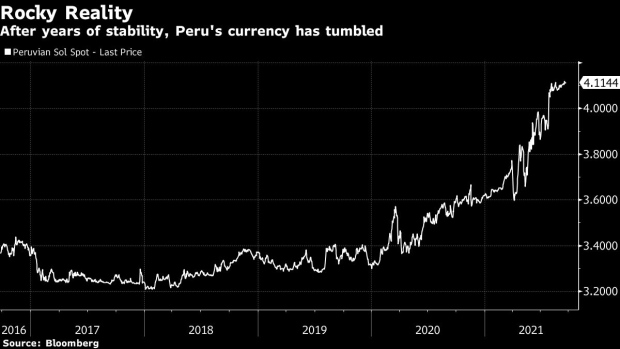Sep 23, 2021
Investors Pepper Peru’s Money Man With Questions About His Boss
, Bloomberg News

(Bloomberg) -- Pedro Francke, the finance minister of Peru, had a hard time getting investors to focus on money when he sat down with them this week.
It’s not that they don’t care about the nitty-gritty specifics of his plans to keep the budget deficit and inflation in check and to accelerate economic growth.
It’s just that, as a minister serving in the cabinet of Pedro Castillo, a little-known ex-teacher with close ties to Peru’s extreme left, what investors wanted to hear most was Francke’s take on what political path his boss will take and how he will deal with an opposition-dominated Congress that has proven quick to impeach presidents over the years.
“They’d say: ‘We’ve reviewed the numbers and they look good, now let’s talk about politics,’” Francke said in an interview after four days of meetings in Washington and New York.
“I understand,” he went on. “I try, and hope to give a good explanation of the political situation in Peru and how in reality I don’t see any major problems of stability.”
Foreign investors can be forgiven for finding the political situation in Peru confusing. After Castillo emerged from relative obscurity earlier this year to win the presidency on the ticket of a Marxist party, Peru’s long-time macroeconomic stability and predictability seemed suddenly in peril.
Francke, a former World Bank economist who began working with Castillo during the campaign, insists that the country is keeping its path of responsible spending while looking to increase social well being in a country that has posted the world’s highest death rate during the pandemic.
Since taking office, Castillo appointed far left officials to several key posts including prime minister in a show of influence by his political godfather, Vladimir Cerron, who runs the Peru Libre party. The fragmented unicameral congress, which wields great power in Peru, decided to approve the cabinet despite objections to many of the names, as denying the vote of confidence could work in Castillo’s favor down the line.
Investors have responded by dumping Peruvian assets. The sol is one of the worst-performing currency in emerging markets, having lost 12% this year. And the government’s dollar bonds have lost 5.2%, compared with an average gain of 0.3% for all developing-nation debt.
Francke downplayed the possibility that this slump will turn into a full-blown rout. Appetite for the debt, he said, remains high, both for dollar and sol-denominated securities. And even after the sell-off, Peru’s benchmark bond maturing in 2031 yields just 2.6%, underscoring how investors remain sanguine about the country’s financial prospects.
The Peru Libre party is already collecting signatures to push for an overhaul of the constitution, a move that Francke insists, is separate from the government’s plan of action.
When Francke returns to Lima, he’ll turn his attention to pushing through a tax reform that looks to extract more from mining activities and will also target a levy on streaming services. The tax reform together with a crackdown on evasion will allow the government to increase revenue by 1.5%-2% of GDP, the minister said.
In ten days, the government will ask congress for legislative powers to carry out changes to the tax rules with plans to have it ready for implementation by the of the year.
In the end, investors need to listen directly to the president, including his speech at the UN this week, where he made clear that he plans to work with the private sector, Francke said.
“The message has been very clear and I think it’s dissipated doubts that could have been lingering,” he said.
©2021 Bloomberg L.P.






